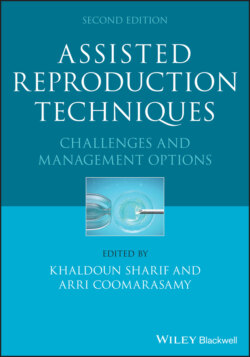Читать книгу Assisted Reproduction Techniques - Группа авторов - Страница 159
Management options
ОглавлениеThe renal transplant recipient should be well counseled prior to any fertility treatment. The couple must be aware of the risks involved with IVF treatment as well as the risks that may be encountered during pregnancy. Patients should be seen before planning fertility treatments by their renal physician and obstetrician in a multidisciplinary team setting. It must be decided whether IVF is appropriate and to optimize renal function and immunosuppressive therapy prior to embarking on treatment. MMF should be stopped and patients should be ideally switched to using tacrolimus or azathioprine three months before treatment (Case History 1). There may also need to be adjustment to antihypertensive therapy regimes, especially if the patient is taking ACE inhibitors.
The American Society of Transplantation Consensus Opinion advises that renal function is optimal when serum creatinine <1.5 mg/dl, with <500 mg/24 h protein excretion. There should be no concurrent infections and the woman should be using nonteratogenic immunosuppressive therapy, which is stable at maintenance levels in order for conception to be attempted [33]. In practice, women should wait for one year after receiving renal transplant as the risk of rejection is highest in the first year [32,33].
Renal allograft rejection during pregnancy should be considered throughout the gestation with surveillance of serum immunosuppressive levels. Immunosuppressive drug levels may be altered due to increasing glomerular filtration as pregnancy progresses [2,33].
It is important to consider the welfare of the child before a renal transplant recipient commences any fertility treatment. This should consider the risk of prematurity and also the risk of inherited renal disease. For conditions such as Alport’s syndrome and Polycystic Kidney Disease, preimplantation genetic testing should be considered with appropriate genetic counseling.
The IVF regimen should adopt a cautious approach. The GnRH antagonist protocol can be used with a low threshold for implementing a gonadotropin agonist trigger for final oocyte maturation to reduce the risk of OHSS (Case History 2) [34]. The use of dopamine agonists to further reduce the risk of OHSS may also be considered [35].
A senior IVF clinician should be involved throughout the IVF treatment and oocyte retrieval should be performed by a clinician of appropriate expertise due to the positioning of the allografted kidney. Single embryo transfer should be advised in renal transplant recipients due to the markedly increased risks of preeclampsia, diabetes, prematurity and low birth weight babies in multiple pregnancies.
Lastly, in patients with proteinuria and/or antiphospholipid antibodies, low molecular weight heparin prophylaxis and aspirin should be considered during the IVF process to decrease the risk of thrombosis.
